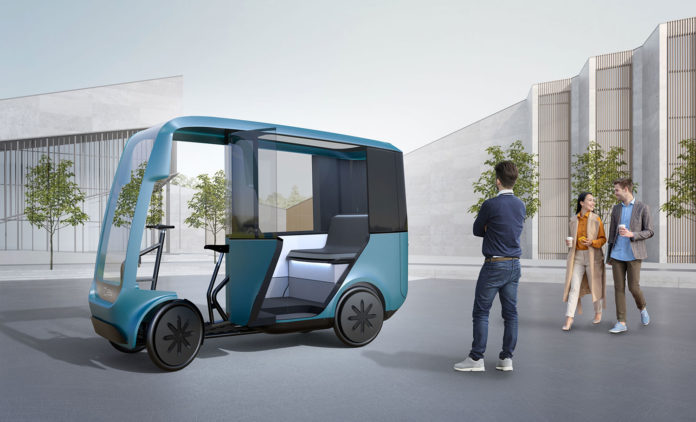Electric cars, vans, and taxis are actually hugely inefficient in their energy usage. They’re large and heavy, and a lot of energy is simply wasted just moving their own weight around.
Now, the Oxfordshire-based micro-mobility manufacturer Electric Assisted Vehicles (EAV) has introduced a new design for their range of the ultra-lightweight, zero-emission mobile vehicle. EAV’s urban cargo vehicles use a pedal-assist electric drive platform to provide, among others, city-based logistics, food, and drink delivery, facilities maintenance, utility businesses with a more efficient, cheaper, and far healthier form of commercial transport, reducing carbon and particulate emissions significantly.
EAV has now been able to create a passenger-carrying solution on the established and patented Cloudframe chassis. The newly announced EAV Taxi provisionally named the ‘EAVGo,’ is a modified version of the recently launched ‘EAV2cubed’ eCargo vehicle. The EAV Taxi is an ultra-lightweight passenger vehicle capable of carrying up to 2 people rather than cargo in its rear compartment and has a separate front cab.
The ultra-lightweight passenger vehicle comes with full suspension, lightweight side doors, foam seat and back cushions, and a video display for tracking journey information. Besides, the cabin heating or cooling creates a comfortable ambient temperature for all part of the EAV Taxi experience. You will find a luggage compartment beneath the seats with access either from the rear or from the side, and it can comfortably accept a good size suitcase.
There are currently 375,000 taxis and private cars in the UK, and according to the British company, there are 200,000 individual taxi rides in London traveling every day from 1 to 5 miles. EAV wants to save resources by offering its own transport, which is 90% lighter than a hybrid or electric car. Just replacing an Uber hybrid with an EAV Taxi would save about 9.2 metric tons of Carbon Dioxide emissions in one year alone.
“Our energy usage is a fraction of an electric taxi, and we don’t need an infrastructure to charge our batteries, just a normal plug socket,” said Nigel Gordon-Stewart, Executive Chairman at EAV. “Most importantly, the EAV Taxi would get a passenger to their destination in any town or city just as quickly, safely, and comfortably as any other taxi or PHV. With a number of current taxis and PHVs shortly being unable to operate in ULEZ towns and cities without paying high charges, the EAV Taxi is the perfect solution.“
With the mass introduction of vehicles, the traffic of taxis will be halved. EAV plans to launch EAV Taxi in the spring of 2021.
